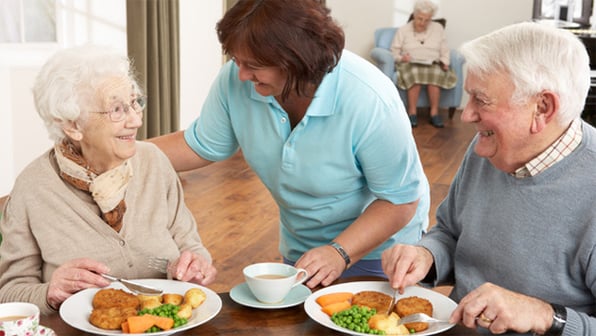Developing Better Eating Habits For Seniors: Strategies That Work

Residents’ quality of life is significantly affected by mealtime experiences and nutrition status. Unfortunately, older people may lack interest in food due to changing taste buds, dementia, health problems, medication side effects, or mental health problems. Some may refuse to eat due to the lack of appetite. This becomes a big problem for caregivers because seniors need to stay healthy by eating well-balanced diets high in nutritional value, immune-supporting antioxidants, and fiber. That said, here are some strategies can be used to promote better appetite and increase food intake:
Solve medication side effects discomforts
Some medications are known to cause dry mouth. Ask seniors under medication to brush their teeth, chew some sugar-free gum, or use oral rinse before meals. Doing so reduces discomfort, encourages flow of saliva, and improves the ability to taste, which may enhance their appetite.
Add some colour
Bright contrasting colours, such as a yellow plate on a white tablecloth, help residents to distinguish between the objects. Researchers found that seniors suffering from Alzheimer’s ate more food when it was served on a coloured plate. In the study, seniors were served foods on white plates and on red plates. The seniors who had meals on red plates ate about 25 percent more food than the others.
Create a nice dining experience
The atmosphere created in the dining room can have a big impact on the residents. Studies show that simple changes like using tablecloths, placing flowers on the tables just prior to meal service, calm relaxing background music and nice tableware greatly increase residents’ desire to stay and enjoy their meal. Using a small table decoration can stimulate conversation between residents and add atmosphere to the dining room.
Make eating easier
We all enjoy a tasty snack and that’s why finger foods should be a priority to help senior eat more easily and frequently. Vegetables, crisps, nuts, chicken nuggets, and a variety of fruits such as raspberries, bananas, strawberries, and grapes among others that have strong contrasting colors are some of the fingers foods that encourage seniors to eat. The more you experiment with these foods, the more you will discover the healthy ingredients your seniors get excited to eat.
Take advantage of their hungry moments
If a senior asks for more food, give them as much as they want. It doesn’t matter what time of the day it is or the type of food it is; just capitalize on their hunger to add a few more nutrients and calories into their body.
Water, water everywhere
Dehydration suppresses appetite and it’s thus essential to encourage your seniors to drink water between meals and try to keep the beverages for post-meals. Liquids are essential in moistening and swallowing food safely but plan your serving because having lots of fluids during meals can fill up seniors and limit how much they’ll eat.
Stimulate appetite through alcohol
As with everything in life, moderation is key to a healthy lifestyle. Incorporating a little wine or beer before a meal every so often can help stimulate senior’s appetite. However, check with the doctor before doing so to ensure the alcohol won’t harm their health or interfere with medication.
Would you like to learn more about how MED e-care can help you?





